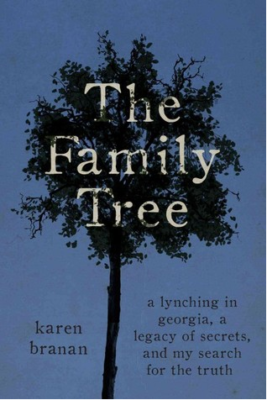The Family Tree: A Lynching in Georgia – Karen Branan

The author was born and raised in Georgia and her grandfather and great-grandfather were Sheriffs there. In searching for more information about a story her father had told her about accidentally killing a young black woman in Hamilton, GA, she instead stumbles on the story of a lynching that took place there on Jan. 22, 1912. Her grandmother had mentioned the lynching in passing some years earlier, but it wasn’t until she started interviewing her extended family back in Georgia that she understood her Sheriff great-grandfather might have had a role in it.
The book is well written, which is not a surprise since the author is a journalist by profession. For those who have done some genealogy, following the many families and family members will likely not be a distraction from the story. I’ve seen other reviews saying the cast of characters is hard to follow and made it difficult to follow the threads of relations and family connections. This is truly an integral part of the story she is telling – the family relationships both acknowledged and unacknowledged that ran across the racial spectrum of black and white.
Karen Branan spent decades researching and writing this book. It is an important look at lynching in the context of race relations overlapped with familial relations. There is a lot of history in these pages that I was unfamiliar with and it helped to explain things like the race riot in Atlanta in 1906.
And it’s personal. It’s her family’s story. It’s coming to terms with her family’s role in the lynching of four innocent people, one of them the first woman ever lynched in Georgia.
My husband’s paternal family has spent generations in Georgia and he has wondered aloud what his family’s own experience was between the post-Revolutionary war years and the desegregation of schools in the 1960s which he remembers very well as being part of his own high school experience. Most of us will never know that kind of family history, which makes Karen Branan’s journey all the more intriguing for the tenacity with which she pursues the truth of Hamilton’s history and her family’s role in what happened there.